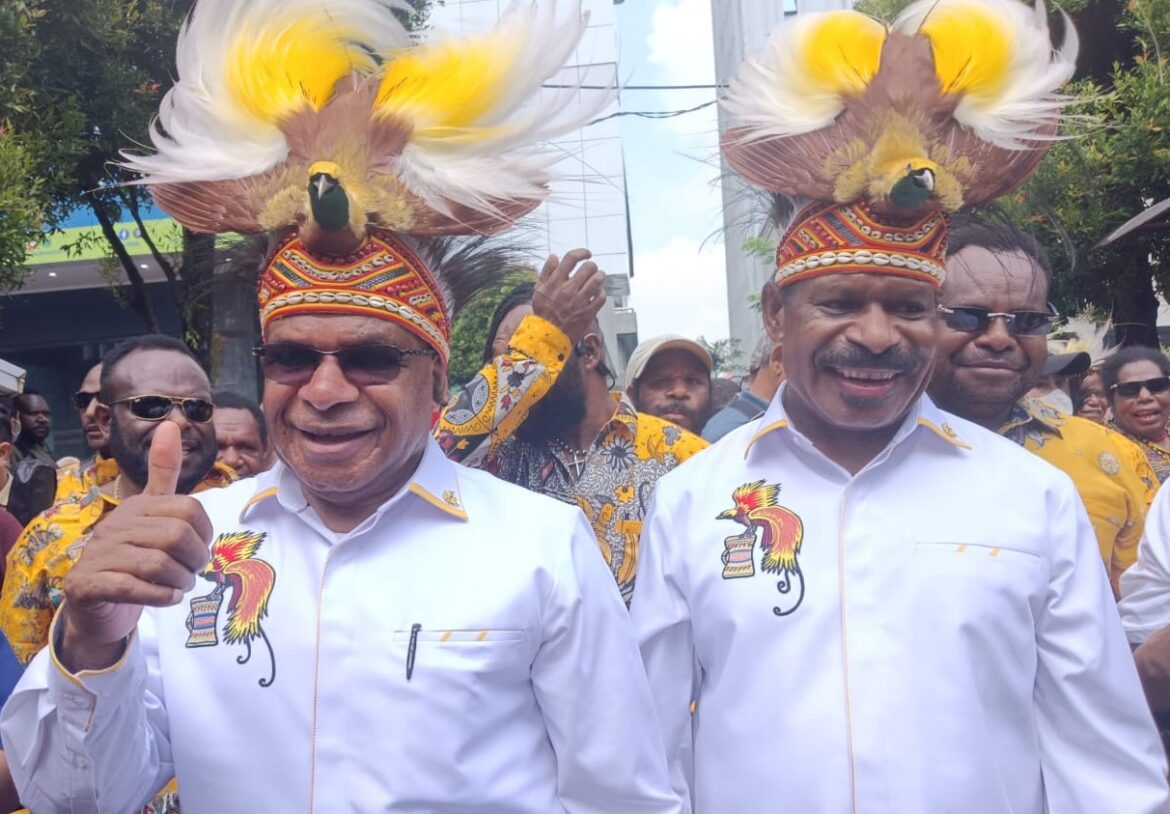A wave of coordinated attacks by the West Papua National Liberation Army–Free Papua Movement (TPNPB–OPM) has targeted government officials, infrastructure, and civilians in Papua, escalating concerns over the worsening security crisis. The primary target in the latest incident: Elvis Tabuni, the Regent of Puncak.
Attempted Assassination at Ilaga Airport
On May 24, 2025, an aircraft carrying Regent Elvis Tabuni and his entourage from Timika to Ilaga came under direct gunfire during its landing approach at Aminggaru Airport. Indonesian military sources confirmed that members of the armed separatist group fired multiple rounds from surrounding hillsides.
Although no injuries were reported, the incident marked a blatant attempt to assassinate one of the region’s top local government officials. This act of aggression follows an increasing pattern of hostility by TPNPB toward leaders they consider unsupportive of the Papuan separatist movement.
OPM Claims Arson Attacks on Regent’s Homes and District Office
Barely a month after the airport attack, the OPM escalated their offensive. On July 7, 2025, armed rebels set fire to two houses owned by Regent Tabuni in the Ilaga district, as well as a local government office in Omukia. The arson was confirmed by both local authorities and TPNPB spokesperson Sebby Sambom, who claimed responsibility.
Sambom justified the attacks by alleging that the properties were being used as military posts by Indonesian security forces—a common claim by the separatist group in response to the Indonesian military’s widespread presence in the region. However, local leaders denied these claims and described the destruction as a targeted act of political terror.
“These were private homes and community infrastructure. Burning them was a crime against both the state and the people of Puncak,” said a local district official, who asked not to be named for security reasons.
Background: Why Target Regent Elvis Tabuni?
Elvis Tabuni is a native Papuan politician from Papua who served as a member of the Papuan People’s Representative Council (2019-2024) and the Regent of Puncak since February 21, 2025. Elvis Tabuni has publicly supported development programs initiated by Jakarta and refused to back the separatist agenda. His alignment with the central government, particularly his cooperation with the Indonesian National Armed Forces (TNI) and police in securing remote regions, has put him at odds with pro-independence groups like the OPM.
Sources close to the local government believe that his refusal to endorse OPM’s calls for independence is the reason for the recent attacks. Analysts say that OPM’s actions aim to intimidate other local leaders who choose diplomacy and development over rebellion.
Impact on Civilians: A Community Under Siege
The broader impact of OPM’s operations is being felt across the highlands of Papua. Civilians have increasingly found themselves caught between state security forces and separatist militias. In Ilaga and surrounding areas, dozens of families have reportedly fled their homes following the TPNPB-OPM attacks, fearing reprisals or being mistaken for government supporters.
Local churches and humanitarian workers report that public facilities such as schools and churches are being avoided or vacated, especially in areas close to military checkpoints or rebel strongholds. “People are afraid. They don’t want to be near government buildings anymore—they’re afraid they might become targets,” said a humanitarian worker based in Puncak.
Escalating Militarization and Rebel Strategy
The TPNPB–OPM has increasingly adopted asymmetric warfare tactics, including attacks on infrastructure and civilian targets deemed “collaborators.” Burning homes, torching schools, and sabotaging small airstrips have become hallmarks of their campaign to resist what they call “military occupation” by Indonesia.
In contrast, the Indonesian military claims that its presence is solely for the protection of the local population and to ensure that development programs—including road construction, education, and healthcare—can continue unhindered.
However, human rights groups warn that this militarization is contributing to an environment of fear, where civilians are often left vulnerable and voiceless.
Government Response and the Road Ahead
Indonesia’s Coordinating Minister for Political, Legal, and Security Affairs, Budi Gunawan, condemned the attacks as “acts of terrorism” and pledged increased military support in Papua to “secure the sovereignty of the Republic.”
The central government has also called on local leaders to remain vigilant and united. “Attempts to divide our unity through violence will not succeed,” said a spokesperson for the Ministry of Home Affairs.
Despite the heightened risk, Regent Tabuni has remained in his post. Although he has not made any public statements since the arson attacks, sources in Jayapura, the provincial capital, report that he is still coordinating humanitarian aid and recovery efforts for displaced residents.
Conclusion
The attempts to assassinate Elvis Tabuni and destroy his property mark a disturbing new chapter in Papua’s decades-long separatist conflict. While OPM claims to be fighting for independence, their actions—targeting civilians, razing homes, and silencing dissenting Papuan voices—raise critical questions about the cost of their campaign.
As the conflict intensifies, it is the people of Papua who continue to suffer—trapped between the flames of rebellion and the force of military counter-insurgency, with peace and progress hanging precariously in the balance.


